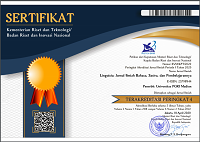Investigating students preception of gamification on vocabulary learning using Marbel
Abstract
It is critical to know and memorize the vocabulary of a foreign language if one wishes to learn it, and repetition is necessary to aid in the retention of new knowledge. This paper investigated primary school students’ perception of gamification on vocabulary learning with 32 participants divided into two groups: Primary 1 and Primary 2. The research purpose on perception using Marbel for primary students and conducted with quantitative method. The results of this research show that gamification can improve students’ vocabulary size with majority of students’ feedback saying that they preferred Marbel than worksheet to learn vocabulary. At the same time, students were learning through their failures throughout the gameplay, they were encouraged to memorize the words. This will help students grow into independent and competent learners.
Keywords
Full Text:
PDFReferences
Abrams, S. S., & Walsh, S. (2014). Gamified vocabulary: Online resources and enriched language learning. Journal of Adolescent & Adult Literacy, 58(1), 49-58. https://ila.onlinelibrary.wiley.com/doi/abs/10.1002/jaal.315
Agustín-Llach, M. P., & Alonso, A. C. (2017). Fostering learner autonomy through vocabulary strategy training. In Autonomy in second language learning: Managing the resources (pp. 141-158). Springer. https://link.springer.com/content/pdf/10.1007/978-3-319-07764-2_9.pdf
Alemi, M. (2010). Educational games as a vehicle to teaching vocabulary. The Modern Journal of Applied Linguistics, 2(6), 425-438.
Aqsha, M., & Pei, C. (2009). Language learning via ICT: Uses, challenges and issues. Wseas transactions on information Science and applications, 6(9), 1453-1467.
Azman, W., & Mei, L. (2015). Effect of multimedia principle on vocabulary learning among second language learners. Proceedings of SOCIOINT. 15-2nd International Conference on Education, Social Science and Humanities. Istanbul, Turkey,
Cakrawati, L. M. (2017). Students’ Perceptions on the Use of Online Learning Platforms in EFL Classroom. ELT Tech: Journal of English Language Teaching and Technology, 1(1), 22-30. https://ejournal.upi.edu/index.php/elttech/article/view/9428
Cárdenas-Moncada, C., Véliz-Campos, M., & Véliz, L. (2020). Game-based student response systems: The impact of Kahoot in a Chilean vocational higher education EFL classroom. Computer-Assisted Language Learning Electronic Journal (CALL-EJ), 21(1), 64-78. http://callej.org/journal/21-1/Cardenas-Veliz-Veliz2020.pdf
Dehghanzadeh, H., Fardanesh, H., Hatami, J., Talaee, E., & Noroozi, O. (2019). Using gamification to support learning English as a second language: a systematic review. Computer Assisted Language Learning, 1-24. https://www.tandfonline.com/doi/abs/10.1080/09588221.2019.1648298
Facer, K., Joiner, R., Stanton, D., Reid, J., Hull, R., & Kirk, D. (2004). Savannah: mobile gaming and learning? Journal of Computer Assisted Learning, 20(6), 399-409. https://onlinelibrary.wiley.com/doi/abs/10.1111/j.1365-2729.2004.00105.x
Folse, K. S. (2004). Vocabulary Myths: Applying Second Language Research to Classroom Teaching. University of Michigan Press. https://doi.org/https://doi.org/10.3998/mpub.23925
Hu, H.-P., & Deng, L.-J. (2007). Vocabulary acquisition in multimedia environment. US-China Foreign Language, 5(8), 55-59. http://citeseerx.ist.psu.edu/viewdoc/download?doi=10.1.1.116.5159&rep=rep1&type=pdf
Kapp, K. M. (2012). The gamification of learning and instruction: game-based methods and strategies for training and education. John Wiley & Sons.
Kingsley, T. L., & Grabner‐Hagen, M. M. (2018). Vocabulary by gamification. The Reading Teacher, 71(5), 545-555. https://ila.onlinelibrary.wiley.com/doi/abs/10.1002/trtr.1645
Krauß, S. (2015). Apps for learning German vocabulary-What does the digital landscape look like? German as a foreign language(2).
Malone, T. W., & Lepper, M. R. (2021). Making learning fun: A taxonomy of intrinsic motivations for learning. In Aptitude, learning, and instruction (pp. 223-254). Routledge. https://www.taylorfrancis.com/chapters/edit/10.4324/9781003163244-10/making-learning-fun-thomas-malone-mark-lepper
Medina, E. G. L., & Hurtado, C. P. R. (2017). Kahoot! A digital tool for learning vocabulary in a language classroom. Revista Publicando, 4(12 (1)), 441-449. https://www.revistapublicando.org/revista/index.php/crv/article/view/673
Nakata, T. (2011). Computer-assisted second language vocabulary learning in a paired-associate paradigm: A critical investigation of flashcard software. Computer Assisted Language Learning, 24(1), 17-38. https://doi.org/https://doi.org/10.1080/09588221.2010.520675
Nation, I. S., & Huston, S. (20013). Learning vocabulary in another language. Cambridge University Press. https://doi.org/https://doi.org/10.1017/CBO9781139858656
Nayan, S., & Krishnasamy, H. N. (2015). A preliminary study on vocabulary learning strategies used by the students from the Faculty of Accountancy. International Journal of Languages, Literature and Linguistics, 1(1), 10-14. http://www.ijlll.org/vol1/3-X10003.pdf
Rachels, J. R., & Rockinson-Szapkiw, A. J. (2018). The effects of a mobile gamification app on elementary students’ Spanish achievement and self-efficacy. Computer Assisted Language Learning, 31(1-2), 72-89. https://www.tandfonline.com/doi/abs/10.1080/09588221.2017.1382536
Saengpakdeejit, R. (2014). Strategies for dealing with vocabulary learning problems by Thai university students. Humanities, Arts and Social Sciences Studies (FORMER NAME SILPAKORN UNIVERSITY JOURNAL OF SOCIAL SCIENCES, HUMANITIES, AND ARTS), 147-168. https://so02.tci-thaijo.org/index.php/hasss/article/view/13451
Shen, W.-W. (2003). Current trends of vocabulary teaching and learning strategies for EFL settings. Feng chia journal of Humanities and social sciences, 7(1), 187-224.
Stahl, S. A., & Stahl, K. (2004). Word wizards all! Teaching word meanings in preschool and primary education. In Vocabulary instruction: Research to practice (pp. 59-78). Guilford Press. https://nyuscholars.nyu.edu/en/publications/word-wizards-all-teaching-word-meanings-in-preschool-and-primary-
Sun, J. C.-Y., & Hsieh, P.-H. (2018). Application of a gamified interactive response system to enhance the intrinsic and extrinsic motivation, student engagement, and attention of English learners. Journal of Educational Technology & Society, 21(3), 104-116. https://www.jstor.org/stable/26458511
Tan Ai Lin, D., Ganapathy, M., & Kaur, M. (2018). Kahoot! It: Gamification in Higher Education. Pertanika Journal of Social Sciences & Humanities, 26(1).
Vitianingsih, A. V. (2016). Game edukasi sebagai media pembelajaran pendidikan anak usia dini. Inform, 1(1), 25-32. http://repository.unitomo.ac.id/id/eprint/75
Waluyo, B. (2020). Learning outcomes of a general English course implementing multiple e-learning technologies and active learning concepts. Journal of Asia TEFL, 17(1), 160. https://www.academia.edu/download/62797428/Research_article20200403-74840-1ggtkjd.pdf
Weissheimer, J., de Souza, J. G. M., Antunes, J. P. L., & de Souza Filho, N. S. (2019). Gamification and L2 vocabulary learning: The Vocabox experience in the languages without borders program. Revista Linguagem & Ensino, 22(4), 1136-1154. https://periodicos.ufpel.edu.br/ojs2/index.php/rle/article/view/16453
Yaman, I., Senel, M., & Yesilel, D. B. A. (2015). Exploring the extent to which ELT students utilise smartphones for language learning purposes. South African Journal of Education, 35(4). https://www.ajol.info/index.php/saje/article/view/127067
Yolageldili, G., & Arikan, A. (2011). Effectiveness of using games in teaching grammar to young learners. Online Submission, 10(1), 219-229. https://eric.ed.gov/?id=ED527862
Yunus, M. M., Kwan, L., Said, N., Karim, K., Jani, R., & Shamsul, M. (2012). Educational gaming: The influence of video games on ESL students’ writing skills. WSEAS International Conference. Proceedings. Recent Advances in Computer Engineering Series,
Zebua, E. P. (2020). The Analysis of the Students’Perception Toward Online Learning in Listening Subjects During Pandemic Time of Covid 19. DIDAKTIK, 14(2), 2448-2453. https://ojs.ikipgunungsitoli.ac.id/index.php/dk/article/view/84
Zhang, H., Song, W., & Burston, J. (2011). Reexamining the effectiveness of vocabulary learning via mobile phones. Turkish Online Journal of Educational Technology-TOJET, 10(3), 203-214. https://eric.ed.gov/?id=EJ944968
Zou, D., Huang, Y., & Xie, H. (2021). Digital game-based vocabulary learning: where are we and where are we going? Computer Assisted Language Learning, 34(5-6), 751-777. https://www.tandfonline.com/doi/abs/10.1080/09588221.2019.1640745
Article Metrics
Abstract has been read : 1073 timesPDF file viewed/downloaded: 0 times
DOI: http://doi.org/10.25273/linguista.v5i2.10387
Refbacks
- There are currently no refbacks.
Linguista: Jurnal Ilmiah Bahasa, Sastra, dan Pembelajarannya indexed by:
View My Stats








